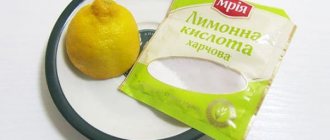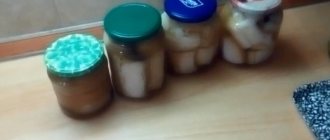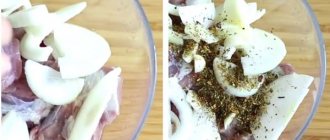Quite often in culinary recipes there is an instruction to “sprinkle the dish (mainly salads) with lemon juice.” Citrus fruits are generously added to baked goods. Sour lemon juice makes it less cloying. Citrons are added to both dough and creams. They use both the zest of the exotic fruit and candied pieces of pulp and skin. But most often the ingredient in dishes is lemon juice. It is added both to soups (for example, solyanka) and to drinks - tea, alcoholic and refreshing cocktails. This article is devoted to one question: is it possible to replace lemon juice with citric acid? And if so, how to introduce white crystals into a dish? What are the proportions? What needs to be done to make the dish taste as if it contained natural lemon juice? You will read about this below.
How much lemon juice is in one lemon?
Naturally, the larger the lemon, the more juice you will squeeze out of it. On average, one small lemon will yield 2-3 tablespoons of juice, one medium-sized lemon will yield about 4 tablespoons, and a large lemon will yield almost 5 tablespoons of lemon juice.
Interesting materials:
How to clean powder from a washing machine? How to clean a washing machine using soda? How to clean rust from a countertop? How to clean silicone from a countertop? How to clean rhinestones from glue? How to clear Google search bar? How to clear the search bar? How to clean the joints between tiles in the bathroom? How to remove the handle from a bag? How to clean a ballpoint pen from a bag?
What are the benefits of citric acid?
Even small children know how healthy lemon is. It contains a lot of substances necessary for humans. After all, lemon is a record holder only in terms of the content of ascorbic acid alone. But in addition to ascorbic acid, which strengthens the immune system, fights viruses and other pathogenic microorganisms, lemon contains minerals, essential components, organic acids and many other valuable components. Lemon juice is a natural extract in which all of the above elements are concentrated.
Citric acid is a dry extract obtained from a natural fruit as a result of a complex technological process. Although there are losses during the production of this dietary supplement, most of the beneficial substances still remain unchanged. Therefore, citric acid can be used instead of lemon, both in the process of preparing various dishes, and for household and other purposes.
Methods of application
As noted above, citric acid is a complete analogue of the fresh product. Therefore, if necessary, you can safely replace the juice with citric acid without worrying about the consequences. Here are some practical recommendations:
- At high temperatures, you need to dissolve a little lemongrass powder in cool water, and then rub the resulting solution into the area around the ankles and arms. Approximately 10 minutes after the procedure, the temperature will begin to decrease.
- The drink is also useful for insomnia. Of course, it is better to squeeze a slice of fresh lemon into a glass, but if this is not available, replacing the fruit with citric acid is quite suitable.
- A bag of acid can also help those who want to lose weight. An effective remedy can be obtained by diluting a teaspoon of powder in a liter of water. True, you should not get carried away with such a replacement, since the calorie content of citric acid is 250 units, versus 16 for fresh fruit.
- In home cosmetology, citric acid diluted with water can also play the role of “first violin” if used as a bleaching agent. You can also freeze the solution and then wipe your face with cubes in the morning. Regularly performing this procedure will return freshness and a healthy glow to the skin.
- Making homemade muffins is incomplete without lemon. True, in this case it is not diluted with water, but simply mixed with soda to enhance the process of carbon dioxide release.
If you want to enjoy the taste of the drink, you must not forget about its usefulness. Under no circumstances should citric acid be diluted with boiling water, as this will destroy vitamin C.
Cooking methods
Now about the most important thing - how to make lemon juice from powder concentrate. There are several options, but they are all simple and quick to execute. But in this process, proportions must be strictly observed, otherwise the taste of the finished product can be spoiled.
Option 1
To replace 60 ml of natural lemon juice, you need to take 5-6 g of citric acid, that is, a level teaspoon. If this amount of powder is diluted in 10 ml of water, the resulting solution will be equivalent in volume to the amount of juice of one medium lemon.
Vinegar essence
The main thing you need to know about this product is that the concentration of vinegar in it is very high - up to 70%. What does it mean? You should use vinegar essence with extreme caution; the marinade may acquire an unpleasant metallic taste or an oily sheen. This happens for one reason: this product is not manufactured for preservation, but serves for technical purposes.
In order not to spoil the taste or appearance of canned cucumbers, when purchasing, it is better to inquire about the quality of the product, purpose, and concentration.
If recipes call for table vinegar, there is no need to do it yourself; it should be diluted in the following proportions:
- 1 spoon of essence per 7 spoons of water (vinegar 9%);
- 1 liter of essence per 8 liters of water (8% vinegar);
- 1 liter of essence per 9 liters of water (7% vinegar);
- 1 liter of essence per 11 liters of water (6% vinegar).
Adhere to the proportions strictly, because the shelf life of preserves and the quality of the finished product depend on the concentration.
Vinegar is a healthy product for the body, but it can quickly and irrevocably damage tooth enamel. To prevent this from happening, after eating home-canned food, you should brush your teeth, or at least rinse them thoroughly several times.
You should not overuse preserves with large amounts of vinegar, even if your favorite lunch is peppers with vegetables.
In some cases, this supplement may stimulate liver or stomach diseases. If there are already family members in the house with such problems, you can try replacing the vinegar with other ingredients.
Using citric acid to prepare the marinade will hardly change the taste of the preserved food.
Ratio of citric acid and water to replace vinegar:
- 9% vinegar - acids 1 tsp. at 14 tbsp. l. water;
- 6% vinegar – 1 tsp. acid per 22 tbsp. l. water;
- 5% vinegar – 1 tsp. acid per 26 tbsp. l. water.
Be sure to take boiled and cooled water. After preparing the acidic solution, you can take on the marinade. Sugar and salt are usually added as needed according to the recipe: citric acid does not require an increase in the weight of the components.
Your Answer:
If you want to add a comment to a question or check with its author for details, do not
use this form and click “Clarify/discuss the question” under the question text!
Single profile MediaFort
Register
What does registration give?
By registering on Povarenka, you can:
- add your own recipes;
- participate in ongoing competitions with many valuable prizes;
- save your favorite recipes to your “Cookbook”;
- ask cooking questions to recipe authors (and get answers!);
- communicate with other cooks on the forum.
It is important to know
- You definitely need to remember that the shelf life of vinegar essence or simple natural vinegar is different. While the acid will not lose its properties for more than ten years, the natural product should only be used for a few years. After this period, the beneficial properties disappear, even if the vinegar looks quite suitable for use.
- It is not recommended to use the essence in mustard preservation recipes. Such a mixture can spoil the workpiece even before it is sent for storage. Instead, it is better to choose a different recipe or use simple table vinegar.
- Acetic acid is a residue from the production of fertilizers from natural gas or sawdust. Before using the product in preparations, you need to think several times whether preservation with such an ingredient will be useful. Even if the contents of a glass container are stored for several years, you should not risk your health when serving your favorite pickled vegetables.
- If you cannot do without preparing acetic acid, you need to store it out of the reach of small children. Such a concentrated product can cause a painful, extensive burn in a child if it comes into contact with the skin, and if ingested, it can be fatal.
- Working with acid requires special attention and caution. If it gets on the skin, immediately rinse the injured area with cold water; if the damage is serious, consult a doctor immediately.
Acetic acid is banned in many countries as a product for use in kitchens. Our shelves are replete with harmful products produced specifically for large-scale production. Before purchasing an essence, you need to decide whether it is worth risking your health.
Rating 2.25 (2 Votes)
Attention, only TODAY!
Apple vinegar
Already from the name itself you can tell that it is made from apples. This product is very healthy and is used for preparing various dishes or even in cosmetology.
Despite all its advantages, apple cider vinegar is not recommended for canning.
Numerous reviews indicate that the blanks are stored for a short time.
If a canning recipe requires the addition of apple cider vinegar, it is better to prepare a small amount of salad or marinades so that they can be consumed in a short time. The short shelf life is compensated by its amazing taste; canned tomatoes or peppers acquire a new vinegary-fruit aroma, which in the blink of an eye will spread throughout the apartment.
When is it possible?
Lemon juice can be replaced with acid from a pack if the dish is planned to be heat treated. With strong heating, beneficial substances still evaporate from the juice. The only thing is that the dish will not have a lemon smell. But this will not affect the taste at all.
Add “lemon” instead of lemon juice:
- in marinades for fish and meat;
- in jam;
- in mousses and creams;
- in syrups and sauces;
- in meringues, fondants;
- into baking dough;
- in soft drinks.
But it is not recommended to spray prepared dishes with the solution. This will not have the best effect on the taste.
How to store?
To preserve the taste and beneficial properties of citric acid, you need to follow the recommendations regarding storage time and place.
Conditions
The nutritional supplement should be stored in hermetically sealed packaging. After opening, the package can be closed with a clothespin or a special clip. Alternatively, you can pour the crystalline powder into a glass or ceramic jar with a tight lid or into a vacuum bag with adhesive tape.
The additive should be kept in a dry and cool place, avoiding moisture and direct sunlight.
Term
The shelf life of the product is indicated on the packaging, on average it is from 1 to 2 years. Using an expired product will not cause harm to health, but it will not give the desired result.
What can replace vinegar for dough?
Vinegar can be replaced with a few drops of lemon. The dough turns out fluffier, airier and without the vinegar taste.
Interesting materials:
Which scientist proposed the term valeology to denote human health? Who wrote A person doesn’t need enough to be at home? Who determines the nationality of each person? Who is Homo Erectus? Who are the elderly? Who voiced the green man in Wreck-It Ralph 2? What is the zodiac sign of people born on February 19? Who gave people fire? Who came first, Batman or Iron Man? Who won a second Oscar for Rain Man?
If the original product is an essence
Standardly in the store it has a concentration of 70%. We will focus on this indicator. Before you figure out the proportions of citric acid instead of vinegar, you need to understand what is considered such.
- If you need a 3% solution, then take 1 teaspoon of essence, dilute it with 23 teaspoons of water. This procedure can be done in advance. To do this, take an empty bottle and pour the prepared solution into it. Now it will be safely stored in the closet.
- A 4% solution is made by mixing one spoon of essence and 17 spoons of water.
- 5% — 1/13.
- 6% — 1/11.
- 9% — 1/7.
Each of these solutions can be transformed into a weaker one by adding water.
Clean product
If we take 100% acid, it is a very interesting product. When cooled to 17 degrees, it becomes not just icy, but crystallizes. This amazing phenomenon cannot be observed at home, because it is not sold in this form in the store. In home cooking we do not encounter such a substance. Typically a 70% acid solution is required. But most often housewives deal with an aqueous solution called table vinegar. Its concentration ranges from 3 to 13%, and this is quite enough for preparing most dishes. You can use citric acid instead of vinegar. Let's look at the proportions a little lower. In the meantime, let's decide what manipulations need to be done with the essence to get a product of the required concentration.
Read also: DIY boat trailer, drawings, dimensions
Description
Citric acid is a food additive used in cooking and everyday life, which was first isolated by a Swedish pharmacist named Karl Scheele in early 1784. In its pure form, which is familiar to people, the additive was obtained only in 1960 in England from calcium citrate. In everyday life, citric acid is used instead of chemicals to clean tiles, bathrooms, etc. from dirt. In cooking, the product is widely used in the preparation of drinks, desserts, preserves, as well as first and second courses. In addition, the nutritional supplement is used by women in cosmetology, as well as for weight loss.
Benefits and harms for the human body
Citric acid is a useful food additive that is even included in baby food. Regular consumption of water with acid (2 g per 200-250 ml) has a beneficial effect on the health of both men and women.
The daily intake of acid for an adult is 4 g, for a child - 60 mg per 1 kg of weight.
The benefits of consuming the dietary supplement are as follows:
- A glass of warm water with citric acid will help relieve sore throat caused by sore throat. The drink also removes toxins and harmful bacteria from the intestines and cleanses the liver. Lemon pop helps relieve heartburn.
- Blood vessels and arteries are cleansed, thereby reducing blood pressure.
- Rinsing your mouth with acidic water helps kill bacteria and germs and freshens your breath.
- The likelihood of joint disease, as well as ligaments and tendons, is reduced.
- The immune system is strengthened and the body’s healing process during viral diseases is accelerated.
- Metabolism speeds up if you drink a glass of water with citric acid on an empty stomach.
- Appetite appears, which is useful for people who have suffered a serious illness or surgery.
- The condition of the skin improves, becoming firmer, more radiant and elastic.
- A drink with citric acid helps get rid of a hangover as it detoxifies the body.
During pregnancy, women can drink tea with the addition of a small amount of citric acid (2-3 g) to get rid of heartburn and swelling. In addition, the drink can be used as an alternative to cold or flu pills.
Newborn babies can receive citric acid particles along with mother's milk to improve immunity. A light drink with acid also helps produce lactose.
It is not recommended for a child to take the nutritional supplement in its pure form, but if it is indicated in baby food, then it can be eaten, the main thing is not to exceed the daily intake (taking into account the baby’s weight). In addition, a solution made from citric acid (5 g) with larkspur (10 g) and boiling water (250 ml) and infused for 6 hours will help cope with such a common childhood ailment as lice and nits. It should be applied to the roots and then combed out.
Citric acid causes harm to the body if it is consumed by people with:
- allergies;
- stomach ulcer;
- inflammation of the oral cavity;
- gastritis with high acidity.
You need to be careful not to get acid into your eyes and nasopharynx, because this can cause a burn.
Exceeding the daily dose of flavor additive consumption can cause serious poisoning, heartburn, stomach pain, and irritation on the skin and gastric mucosa.
The lethal dose of citric acid for an adult is 20 grams taken at a time in its pure form.
Useful tips
The reader may not be aware of the following important properties of lemon:
- If it becomes more and more difficult to fight depression, you need to cut the fruit into slices and spread it around the apartment. The smell of this southern fruit lifts your spirits well.
- Sunny citrus also helps with insomnia. You just need to squeeze a slice of lemon into a glass of water before bed. It will be much easier to fall asleep after such a drink.
- Lemon also helps with calluses. First you need to steam your feet, and then apply a slice of fruit to the damaged skin and put on socks. True, it will take from 10 to 15 similar procedures to get rid of the callus forever.
- If not only the taste is important, but also the benefits, then you should not add lemon to boiling water, as this will destroy vitamin C.
This fruit with a bright skin has a lot of useful properties. He can be a therapist, a nutritionist, and a cosmetologist.











